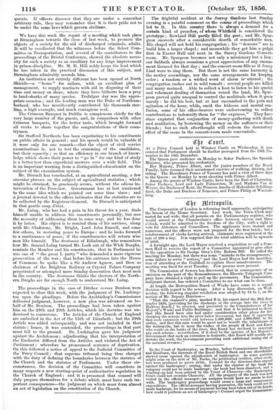We have this week the report of a meeting which
took place at Birmingham towards the close of last week, to promote the objects of a society for the aid of discharged criminals, adults. It will be recollected that the witnesses before the Select Com- mittee on Transportation, and several of the contributors to the proceedings of the Bristol Conference, showed the absolute neces- sity for such a society as an auxiliary for any large improvement in prison-discipline. Mr. M. D. Hill nobly keeps the lead which he has taken in the practical discussion of this subject, and Birmingham admirably seconds him.
An institution not entirely different has been opened at North Shields—a " home " for sailors, with an excellent plan of management, to supply mariners with aid in disposing of their time and money on shore, where they have hitherto been a prey to land-sharks of many species. Trafalgar day was the appro- priate occasion ; and the leading man was the Duke of Northum- berland, who has munificently contributed his thousands ster- ling, a high example, and much contagious zeal.
The Crimean Banquet in Dublin is conspicuous chiefly for the very large number of the guests, and, in comparison with other Crimean banquets, for the better taste, which brought forward all ranks to share together the congratulations of their coun- trymen.
Sir Stafford Northcote has been expatiating to his constituents on public affairs in general ; and his speech would be valuable if it were only for one remark—that the object of civil service
examinations is, not to test the cramming of the candidates, but their capacity ; so that an efficiency in one branch of know-
ledge which shows their power to " go in " for one kind of study is a better test than superficial answers over a wide field. This is an important warning from a distinguished educationist on the subject of the examination system. Mr. Disraeli has vouchsafed, at an agricultural meeting, a few oracular phrases on the subject of agricultural statistics ; which might be obtained, he graciously avows, without the odious in- tervention of the Poor-law. Government has at last awakened to the same idea which we pointed out some time since ; and a journal devoted to the offices intimates that the statistics are to be collected by the Registrar-General. So Disraeli is anticipated in that gentle coup d'etat.
Mr. Laing, who has had a pain in his throat for a year, finds himself unable to address his constituents personally, but sees
the necessity of addressing them in some way, and he has done it by letter. His object is to remind them of his services, along with Mr. Gladstone, Mr. Bright, Lord John Russell, and some few others, in restoring peace to Europe ; and he looks forward to a continuance of peace, if the constituencies will return wise men like himself. The Scotsman of Edinburgh, who remembers how Mr. Samuel Laing turned Mr. Loch out of the Wick Burghs, reminds the Member and his constituents, that in Parliament he was one of " the great L party " who demanded a more vigorous prosecution of the war ; that before his entrance into the House of Commons he spoke like a Sir Andrew Agnew, and then as chairman of the Brighton Railway or Crystal Palace Company perpetrated or attempted more Sunday desecration than most men in the country. The Scotsman thinks the electors of the North- ern Burghs are far enough North to understand Mr. Laing.


























 Previous page
Previous page